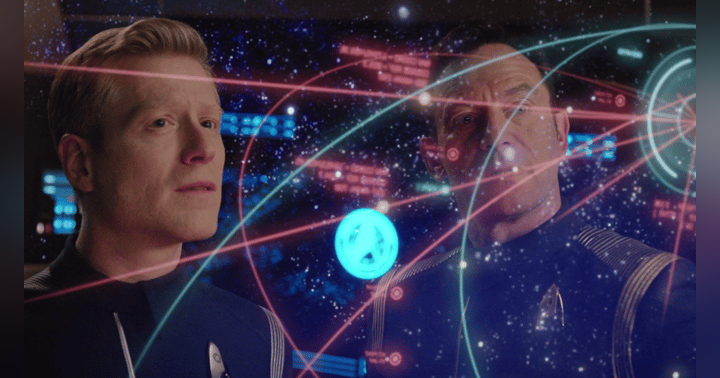Performance Reviews That Actually Work

It’s almost like this episode of Discovery was custom built for this blog! Today we get to talk about performance reviews through the lens of Saru’s leadership in “Choose your Pain.” Do you have a rhythm in place for receiving feedback and assessing your own leadership skills? If not, you may want to implement one by the end of this blog! Let’s see what we can learn about why performance reviews are powerful, as well as what works and what doesn’t.
Saru is a flawed character (aren’t we all?) But in a moment of wisdom and self-awareness, Saru asks the Computer to help. You see, he’s been put in temporary command of Discovery by Admiral Cornwell because of an abduction by a Klingon battlecruiser. So knowing he will be the primary leader in a high-pressure situation, he sets goals, creates expectations, and develops a framework for the kind of leader he wants to be. Awesome!
The first step in his leadership plan is asking the question, “Who can I learn from”? He asked the Computer to list Startfleet’s most decorated Captains and describe what qualities they shared that were key to their success This is a great place to start! No matter your industry, there are always people you can learn from. It’s all about networking! Look for people working for your company or a similar one. Saru is serving in the same organization as three great leaders. He could write them a note or set up a meeting. Maybe your company has source material you can read on great leaders who came before you. Or maybe you need to seek outside experts in books, videos, or conferences. We live in the information age! There is no excuse for neglecting to learn from others.
Right off the bat, let’s take a step together in real time. Think of 3-5 people who exemplify, or at least consistently demonstrate, the qualities you want to have. These don’t have to be leadership qualities. Maybe you’re developing sales or systems skills for your team. Whatever field you are looking to grow and develop in, identify 3-5 standouts. Then list their 4-5 top qualities, their skills, their abilities. Are you familiar with a Pareto chart? I love Pareto charts! They’re based on the Pareto Principle, which you may know as the 80/20 rule. This is used to prioritize problem-solving efforts. I’m dramatically oversimplifying, but the theory is that 80% of your problems can be solved by tackling 20% of the issues. There is an alarming amount of statistical and historical evidence to support this. If this is all new to you, study up on the Pareto Principle and how to use Pareto Charts.
The next step in your growth strategy is to make goals based on what you see in others and what you know to be true about yourself. The Computer tells Saru that the following qualities were key to other captain’s success: bravery, self-sacrifice, intelligence, tactical brilliance, and compassion. These all sound great and are especially helpful when navigating through the space-time continuum. But what about your context? What five qualities would you define as vital for a leader in your position? Pause right now and write it down! Fitzhugh Dodson said, “Goals that are not written down are just wishes.” You can use a Pareto chart to determine the top four or five qualities of the people you identified. List the qualities out by person and note how many of them are shared across the five people. The more shared they are, the higher up the list they go.
Once ideals are defined and goals are set, it's important to implement regular check-ins or assessments. They can be brief or involved, frequent or more spread out. But most importantly, they need to happen! In my experience, the check-ins will range based on how much of a stretch the qualities are for you or your team. If you are already reasonably competent in the area and are working to sharpen or improve your skills, maybe quarterly is a good tempo. If this is new to you, you might need to assess bi-weekly or even weekly. Writing down goals is a necessary first step. But if you never assess whether or not you’re meeting or moving toward your goals, then what's the point? No change will happen. The human condition is to slide back into the path of least resistance unless that default is challenged.
Saru made some beautiful goals. But he didn’t check in throughout his time leading Discovery. He waited until the end to reflect and, sadly, that was too late to create any meaningful change for himself or the crew. What’s crazy is that Saru had some space and ability to slow down and be mindful of his leadership failures. He could have pivoted but missed the chance to do so.
Lorca, on the other hand, was faced with violence and brutality in the face of captors and outperformed Saru. He exhibited bravery, self-sacrifice, intelligence, tactical brilliance, and compassion. What do you think set him up to lead well in this trying situation? Hop over to the Starfleet Leadership Academy Facebook Group and tell me what you think!
Saru finally initiates a performance review with the Computer at the end of his time in charge but then stops it, saying, “I know what I did.” If he really does, then great! Self-awareness is key to being a great leader. But I would argue he didn’t exhibit much self-awareness while he was leading, so I admit that I question his ability to implement change. Simply admitting you didn’t do a great job isn’t reviewing or assessing. It allows for no valuable observations or responsive action items. We need to be different. Ask the hard questions. Where are you doing well? Where do you need to improve?
As we already established, it’s valuable to look outside of ourselves to find what a great leader looks like. But it’s just as important to look inside ourselves to see where we are strong and where we are weak. And sometimes, the best way to do that honestly is to recruit a trusted outsider who can offer unbiased observations and suggestions. You can enroll a coach, mentor, or supervisor to help. Having someone to guide you through execution and discuss your performance is incredibly impactful. If you’re using this for your team, that person should most likely be you. If not you, then someone you know and trust.
You can also use a powerful tool J. Elise Keith talks about in her book, Where the Action Is. It’s called Action Review. These are precisely what they sound like. After an action is taken, you meet up with those involved to review it. These are commonplace in the military, where they call them “after-action reviews.” They also hold before-action reviews to ensure everyone knows the plan prior to execution. But an action review meeting begins with an objective review of the facts followed by discussion on observations and learnings. These can be used to determine an immediate improvement plan. Plus, they offer incredible insight since they should be held right after the action is taken. If Saru had paused to complete action review meetings, this episode may have unfolded very differently.
If you work in an organization that does annual performance reviews, I imagine you think of them as being about as valuable as that little piece of plastic that comes with cheese and cracker packs. But if you roll this framework we just developed into that annual review process, they will become indispensable! Instead of simply going through the motions, they will become a meaningful record of your progress, or your team’s, and can clearly outline performance goals over the next year. In fact, that review time is a great opportunity to refresh your lists! Is it time to swap out one or more of your standouts? Is it time to move down your Pareto chart and start focusing on new skills and qualities? You’ll now have a way to answer those questions and create meaningful progress in you and your team’s skills.
In an attempt to do the best he possibly could, Saru laid out a powerful and simple framework for you and your teams to boldly go where you’ve been working so hard to get to. Let’s take his great start and build on it, shall we? Can you commit to walking through the steps outlined here for the sake of your growth? If you lead a time, can you teach and guide them through this same process? I’d love to hear your stories! Let’s talk over on Twitter, Instagram, or Facebook!
This post contains affiliate links. I may receive a commission for purchases made through these links but it won't cost you any more.

